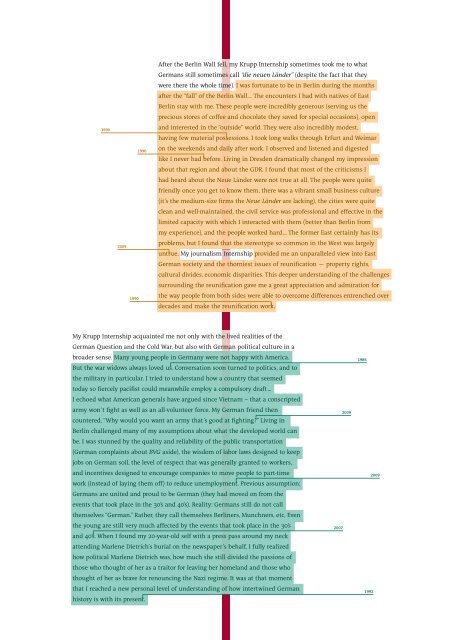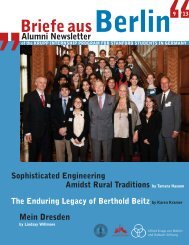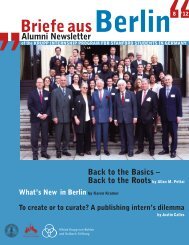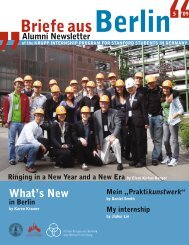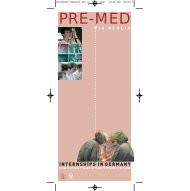The Krupp Intern: Letter to Berthold Beitz - Stanford University in Berlin
The Krupp Intern: Letter to Berthold Beitz - Stanford University in Berlin
The Krupp Intern: Letter to Berthold Beitz - Stanford University in Berlin
Create successful ePaper yourself
Turn your PDF publications into a flip-book with our unique Google optimized e-Paper software.
1990<br />
2009<br />
1990<br />
1996<br />
After the Berl<strong>in</strong> Wall fell, my <strong>Krupp</strong> <strong>Intern</strong>ship sometimes <strong>to</strong>ok me <strong>to</strong> what<br />
Germans still sometimes call “die neuen Länder” (despite the fact that they<br />
were there the whole time). I was fortunate <strong>to</strong> be <strong>in</strong> Berl<strong>in</strong> dur<strong>in</strong>g the months<br />
after the “fall” of the Berl<strong>in</strong> Wall ... <strong>The</strong> encounters I had with natives of East<br />
Berl<strong>in</strong> stay with me. <strong>The</strong>se people were <strong>in</strong>credibly generous (serv<strong>in</strong>g us the<br />
precious s<strong>to</strong>res of coffee and chocolate they saved for special occasions), open<br />
and <strong>in</strong>terested <strong>in</strong> the “outside” world. <strong>The</strong>y were also <strong>in</strong>credibly modest,<br />
hav<strong>in</strong>g few material possessions. I <strong>to</strong>ok long walks through Erfurt and Weimar<br />
on the weekends and daily after work. I observed and listened and digested<br />
like I never had before. Liv<strong>in</strong>g <strong>in</strong> Dresden dramatically changed my impression<br />
about that region and about the GDR. I found that most of the criticisms I<br />
had heard about the Neue Länder were not true at all. <strong>The</strong> people were quite<br />
friendly once you get <strong>to</strong> know them, there was a vibrant small bus<strong>in</strong>ess culture<br />
(it’s the medium-size fi rms the Neue Länder are lack<strong>in</strong>g), the cities were quite<br />
clean and well-ma<strong>in</strong>ta<strong>in</strong>ed, the civil service was professional and effective <strong>in</strong> the<br />
limited capacity with which I <strong>in</strong>teracted with them (better than Berl<strong>in</strong> from<br />
my experience), and the people worked hard ... <strong>The</strong> former East certa<strong>in</strong>ly has its<br />
problems, but I found that the stereotype so common <strong>in</strong> the West was largely<br />
untrue. My journalism <strong>Intern</strong>ship provided me an unparalleled view <strong>in</strong><strong>to</strong> East<br />
German society and the thorniest issues of reunifi cation — property rights,<br />
cultural divides, economic disparities. This deeper understand<strong>in</strong>g of the challenges<br />
surround<strong>in</strong>g the reunifi cation gave me a great appreciation and admiration for<br />
the way people from both sides were able <strong>to</strong> overcome differences entrenched over<br />
decades and make the reunifi cation work.<br />
My <strong>Krupp</strong> <strong>Intern</strong>ship acqua<strong>in</strong>ted me not only with the lived realities of the<br />
German Question and the Cold War, but also with German political culture <strong>in</strong> a<br />
broader sense. Many young people <strong>in</strong> Germany were not happy with America.<br />
But the war widows always loved us. Conversation soon turned <strong>to</strong> politics, and <strong>to</strong><br />
the military <strong>in</strong> particular. I tried <strong>to</strong> understand how a country that seemed<br />
<strong>to</strong>day so fi ercely pacifi st could meanwhile employ a compulsory draft ...<br />
I echoed what American generals have argued s<strong>in</strong>ce Vietnam – that a conscripted<br />
army won’t fi ght as well as an all-volunteer force. My German friend then<br />
countered, “Why would you want an army that’s good at fi ght<strong>in</strong>g?” Liv<strong>in</strong>g <strong>in</strong><br />
Berl<strong>in</strong> challenged many of my assumptions about what the developed world can<br />
be. I was stunned by the quality and reliability of the public transportation<br />
(German compla<strong>in</strong>ts about BVG aside), the wisdom of labor laws designed <strong>to</strong> keep<br />
jobs on German soil, the level of respect that was generally granted <strong>to</strong> workers,<br />
and <strong>in</strong>centives designed <strong>to</strong> encourage companies <strong>to</strong> move people <strong>to</strong> part-time<br />
work (<strong>in</strong>stead of lay<strong>in</strong>g them off) <strong>to</strong> reduce unemployment. Previous assumption:<br />
Germans are united and proud <strong>to</strong> be German (they had moved on from the<br />
events that <strong>to</strong>ok place <strong>in</strong> the 30’s and 40’s). Reality: Germans still do not call<br />
themselves “German.” Rather, they call themselves Berl<strong>in</strong>ers, Munchners, etc. Even<br />
the young are still very much affected by the events that <strong>to</strong>ok place <strong>in</strong> the 30’s<br />
and 40’s. When I found my 20-year-old self with a press pass around my neck<br />
attend<strong>in</strong>g Marlene Dietrich’s burial on the newspaper’s behalf, I fully realized<br />
how political Marlene Dietrich was, how much she still divided the passions of<br />
those who thought of her as a trai<strong>to</strong>r for leav<strong>in</strong>g her homeland and those who<br />
thought of her as brave for renounc<strong>in</strong>g the Nazi regime. It was at that moment<br />
that I reached a new personal level of understand<strong>in</strong>g of how <strong>in</strong>tertw<strong>in</strong>ed German<br />
his<strong>to</strong>ry is with its present.<br />
2007<br />
2009<br />
1986<br />
1992<br />
2009


